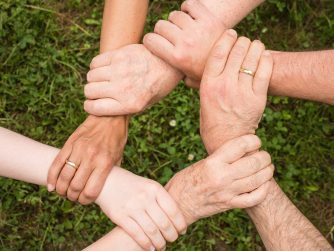 Recently I was invited to participate in a silent retreat. After supper on Thursday evening until lunch on Friday, we were engaged in silence, with the hope that by being silent we could hear the still small voice of God. Creating a silent environment was the easy part. Dealing with the voices in my head and heart was a much different story.
Recently I was invited to participate in a silent retreat. After supper on Thursday evening until lunch on Friday, we were engaged in silence, with the hope that by being silent we could hear the still small voice of God. Creating a silent environment was the easy part. Dealing with the voices in my head and heart was a much different story.
Most of those who participated chose to participate, at least for some time, in solitude. While I will comment on the silent aspect of the retreat in a separate post, I want to talk in this post about the practice of solitude.
Prior to the retreat I was able to read from two books about the discipline of solitude, one from Henri Nouwen and the other from Dallas Willard. This discipline has intrigued me for the past year when I read Paula Huston’s book called The Holy Way, which focused on a search for simplicity in her life. She drew heavily upon the lives of the Desert Fathers in her exploration, and I have been intrigued with the Desert Fathers ever since. Nouwen’s book approaches life from the teachings of the Desert Fathers. I will explore in this post the ideas of Nouwen regarding solitude and in the next post explore the ideas of Willard. Then I will share my own thoughts about solitude.
Solitude is the furnace of transformation. Without solitude we remain victims of our society and continue to be entangled in the illusions of the false self. Solitude is the place of the great struggle and the great encounter – the struggle against the compulsions of the false self, and the encounter with the loving God who confers himself as the substance of the new self.
In order to understand the meaning of solitude, we must first unmask the ways in which the idea of solitude has been distorted by our world. We say to each other that we need some solitude in our lives. What we really are thinking of, however, is a time and a place for ourselves in which we are not bothered by other people, can think our own thoughts, express our own complaints and do our own thing, whatever it may be. For us, solitude most often means privacy. We have come to the dubious conviction that we all have a right to privacy. Solitude thus becomes like a spiritual property for which we can compete on the free market of spiritual goods. But there is more. We also think of solitude as a station where we can recharge our batteries, or as the corner of the boxing ring where our wounds are oiled, our muscles massaged, and our courage restored by fitting slogans. In short, we think of solitude as a place where we gather new strength to continue the ongoing competition in life.
But that is not the solitude of St. John the Baptist, of St. Anthony or St. Benedict. For them solitude is not a private therapeutic place. Rather, it is the place of conversion, the place where the old self dies and the new self is born, the place where the emergence of the new man and the new woman occurs.
In solitude I get rid of my scaffolding: no friends to talk with, no telephone calls to make, no meetings to attend, no music to entertain, no books to distract, just me – naked, vulnerable, weak, sinful, deprived, broken – nothing. It is this nothingness that I have to face in my solitude, a nothingness so dreadful that everything in me wants to run to my friends, my work, and my distractions so that I can forget my nothingness and make myself believe that I am worth something.
But that is not all. As soon as I decide to stay in my solitude, confusing ideas, disturbing images, wild fantasies, and weird associations jump about in my mind like monkeys in a banana tree. Anger and greed begin to show their ugly faces. I give long, hostile speeches to my enemies and dream lustful dreams in which I am wealthy, influential, and very attractive – or poor, ugly and in need of immediate consolation. Thus I try again to run from the dark abyss of my nothingness and restore my false self in all its vainglory.
The task is to persevere in my solitude, to stay in my cell until all my seductive visitors get tired of pounding on my door and leave me alone. The struggle is real because the danger is real. It is the danger of living the whole of our life as one long defense against the reality of our condition, one restless effort to convince ourselves of our virtuousness.
The struggle is to die to the false self. But this struggle is far, far beyond our own strength. The confrontation with our own frightening nothingness forces us to surrender ourselves totally and unconditionally to the Lord Jesus Christ. Alone we cannot face the “mystery of iniquity” with impunity. Only Christ can overcome the powers of evil. Only in and through him can we survive the trials of our solitude.
Our primary task in solitude is not to pay undue attention to the many faces which assail us, but to keep the eyes of our mind and heart on him who is our divine savior.
Taken from Henri Nouwen, The Way of the Heart, 15-21






